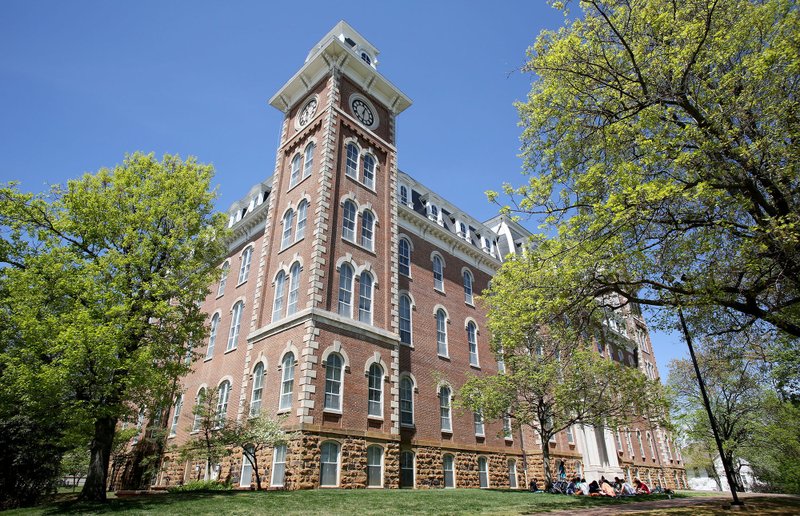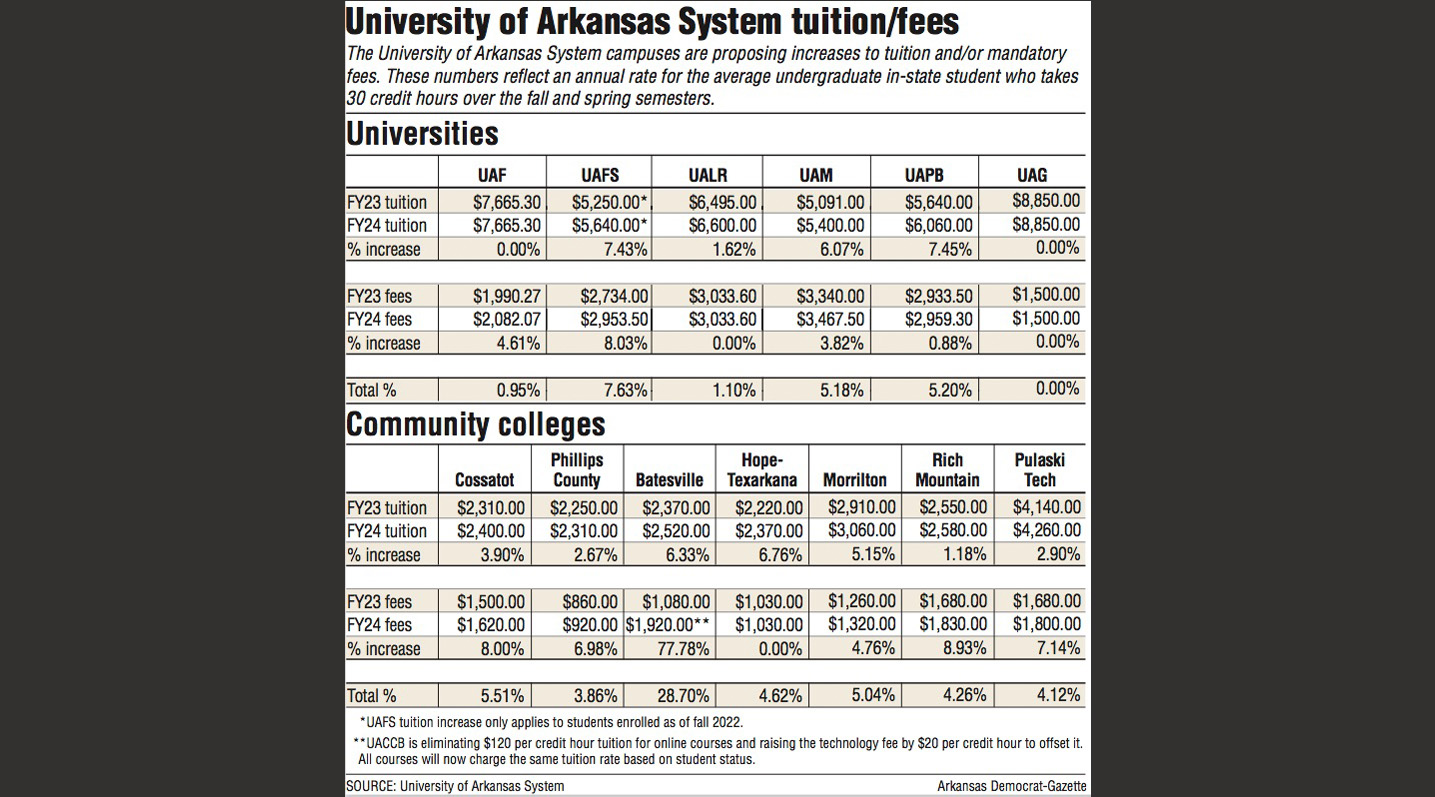MENA -- The Academic and Student Affairs Committee of the University of Arkansas System board of trustees approved 2023-24 tuition and fees proposed by UA System institutions Wednesday.
The full board of trustees will have a chance to approve the rates today.
"It's been a very challenging year," as inflation has "eaten into [our] purchasing power," said UA System President Donald Bobbitt.
While he had hoped the state Legislature might contribute more funds to the state's colleges and universities to attenuate the financial burden on students -- as happened in some other states -- that did not occur in Arkansas, Bobbitt said. Inflation is also "degrading" the personal budgets of the system's employees, so Bobbitt said he encouraged chancellors to reward staff with raises.
"Our greatest cost is personnel," and institutions can't let salaries fall too far behind the private sector, lest employees leave colleges and universities for other opportunities, he said. Institutions derive much of their revenue from tuition and fees, and -- when adjusted for inflation -- the system's schools actually have less money at their disposal per student than five or 10 years ago, which is "remarkable."
It's important to remember most students pay less than the "sticker price" due to scholarships and grants, among other forms of assistance, and even with this year's tuition increases, higher education in Arkansas remains "a bargain" compared with other states in the region and nation, Bobbitt said. He added that the Higher Education Price Index rose 5.2% for the fiscal year ending June 30, 2022.
While enrolling more students would provide more funds, enrollment is dropping at most system schools, mostly as a result of the lower birth rates emerging from the 2008 recession, and the college-going rate is expected to decline at least 20% in Arkansas by 2029, he said.
A strong state economy is also giving youth more "options," he said. Currently, the state unemployment rate is a stunningly low 2.8%, so jobs are plentiful, and young Arkansans don't feel they necessarily need a college degree to procure gainful employment.
"Our job is to deliver value, and I believe we're doing" so, said trustee Ted Dickey. There are programs at every one of "our schools delivering value."
However, the system still needs "to be obsessive about cutting spending" in the future, he said. Deferred maintenance, for example, "is the sleeping giant of our budget."
And the state provides no funding for deferred maintenance, Bobbitt said. Consequently, colleges and universities are increasingly using mandatory fees to address deferred maintenance needs.
The system's schools have found alternative funding streams -- such as philanthropic funds -- and become more efficient, but "there are limits to how far you can go with that," Bobbitt said. "[You don't want] to cut to the point where quality is affected."
Tuition will again remain flat for Arkansans at the system's flagship -- and the state's largest university -- the University of Arkansas, Fayetteville, although mandatory fees will rise more than 4% to $2,082.07, resulting in a nearly 1% increase in cost for tuition and fees. College students generally take 15 credit hours per semester, 30 hours per year, and UA-Fayetteville -- which, contrary to most schools in Arkansas, has actually gained enrollment in recent years -- proposes no change to this year's annual tuition of $7,665.30 for in-state students.
At the University of Arkansas at Little Rock, there will be no increase in the $3,033.60 in mandatory fees, and tuition will be nearly stable, up less than 2%, from $6,495 to $6,600 for the average undergraduate taking 30 credit hours over the fall and spring semesters.
Tuition and fees will be up 5.18% at the University of Arkansas at Monticello, with tuition rising 6.07%, from $5,091 to $5,400, and fees increasing 3.82%, from $3,340 to $3,467.50.
Students at the University of Arkansas at Pine Bluff would see a similar increase, of 5.2%. Though mandatory fees will be up less than a percentage point, $2,933.50 to $2,959.30, tuition will be up 7.45%, from $5,640 to $6,060.
UA-Fort Smith is increasing tuition, but not for students who enrolled prior to the fall of 2022.
UA-Fort Smith lost a local tax revenue source that had been in place since it was a community college, so the university is having to account for that deficit, said Ben Beaumont, senior director of policy and public affairs for the UA System.
For students enrolled as of fall 2022, annual tuition would increase 7.43%, from $5,250 to $5,640. Fees are also jumping, roughly 8%, from $2,734 to $2,953.50.
COMMUNITY COLLEGES
For Phillips Community College of the University of Arkansas, tuition for in-district students would increase 2.67%, from $2,250 to $2,310. Fees would increase nearly 7%, from $860 to $920, driven by the student services fee per credit hour jumping from $2 to $8.
For the University of Arkansas Community College at Hope-Texarkana, tuition would increase 6.76%, from $2,220 to $2,370, for in-district students. There will be no increases in mandatory fees charged to all students from last year, however, remaining level at $1,030.
For the UA Community College at Batesville, in-district tuition would increase 6.33%, from $2,370 to $2,520, and fees will be up from $1,080 to $1,920 as the result of a significant rise in the technology fee.
The Activities/Auxiliary/Facilities Fee -- renamed the Activity/Wellness Assessment Fee -- will actually decrease $2, to $7, per semester, but the Safety Fee -- renamed the Facility/Safety Fee -- will increase from $5 to $15 per credit hour, the technology fee will be up $20 to $35 per credit hour, and the administrative services fee will rise $10 to $15 per semester.
Online courses had been $120 per semester credit hour, but as more students take online classes, the college is standardizing course costs, so all courses will now charge the same tuition rate whether online or in person, Beaumont said. That change is the reason for the $20 increase per credit hour on the school's technology fee.
For the UA Community College at Morrilton, in-district tuition would increase 5.15%, from $2,910 to $3,060. Fees would increase 4.76%, from $1,260 to $1,320, based on the campus improvement fee increasing from $15 to $17 per credit hour.
At Cossatot Community College of the University of Arkansas, in-district tuition -- students of Sevier, Howard, and Little River counties -- would be up 3.9%, from $2,310 to $2,400. Fees would be up 8%, from $1,500 to $1,620.
At the University of Arkansas - Pulaski Technical College, tuition would increase 2.9%, from $4,140 to $4,260. Fees would increase 7.14%, from $1,680 to $1,800.
For in-district students, tuition at the UA Community College at Rich Mountain -- which is hosting this week's trustees meetings -- would increase 1.18%, from $2,550 to $2,580. Fees would be up nearly 9%, from $1,680 to $1,830.
Col. Nate Todd sees "opportunities for our community colleges," said the trustee. They can not only continue to improve the workforce in rural areas, he said, but if the system implements more articulation agreements, where students who graduate with two-year degrees can pay their same community college tuition at four-year universities, more students can achieve higher-level degrees at manageable costs.
UAMS
The University of Arkansas for Medical Sciences is proposing no tuition changes in the College of Medicine and College of Pharmacy. However, tuition would increase in the College of Nursing and College of Health Professions.
Tuition per credit hour for Arkansas residents in the traditional BSN and RN to BSN undergraduate program would rise $6, to $324, or $13 (to $645), for nonresidents. Tuition per credit hour for residents in the accelerated BSN undergraduate program -- at the Northwest Arkansas campus -- would be up $7, to $357, and up $13, to $645, for nonresidents. In the graduate program, tuition per credit hour would be up $9, to $495, and $18, to $888, for residents and non-residents, respectively.
Tuition per credit hour for Arkansas residents in the College of Health Professions would be up $5, to $265, while nonresidents would pay $12 more, at $607. Non-residents in the graduate program would pay $17 more per credit hour, at $852, while residents would see an $8 increase, at $394.
Since 2015, tuition in the College of Medicine has increased to a point where the college is above the regional median, but beginning with the 2023-24 academic year, residents in border states Louisiana, Missouri, Mississippi, Oklahoma, Texas, and Tennessee will be charged in-state rates, according to UAMS. "This will increase our ability to attract high caliber students [who] will enrich the program, elevate our rankings, and increase the likelihood that we are attracting students who will stay in the area."
The College of Pharmacy increased tuition by 5% last year and wants to remain competitive within the region, hence no increases this year, according to UAMS. The Graduate School and College of Public Health also opted to keep tuition steady because current tuition is competitive in the region.
The College of Nursing's tuition increase will keep it competitive with other nursing programs in the state and region, according to UAMS. Compared with other nursing colleges in the state and region, the BSN program is slightly higher in cost, while the graduate programs are below the average in annual cost.
Fees related to all colleges would remain mostly stable, with a couple of exceptions. Most notably, the fee charged to students actively engaged in a degree program but not enrolled in credit-bearing courses/activities, preparing to fulfill graduation requirements, and/or awaiting completion of final licensure tests, would increase $50 to $300 "due to the increased number of students in dual degree programs and corresponding teaching and administration of these programs," according to UAMS.
OTHERS
At the University of Arkansas Clinton School of Public Service, tuition per semester credit hour for the Masters of Public Service will increase from $432 to $472.
This increase is the first year of a three-year plan to adjust tuition over three years, according to the Clinton School. Since the Clinton School launched in the fall of 2005, tuition has increased only once.
Tuition and fees will remain stable at the Criminal Justice Institute.
The same is true for the University of Arkansas Grantham, the system's online school, with annual tuition of $8,850 and fees of $1,500.

